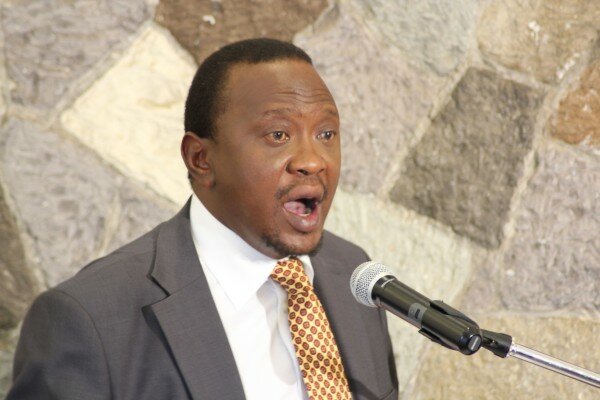
President Uhuru Kenyatta. CC image courtesy of Uhuru Kenyatta, on Flickr.
Kenya’s president Uhuru Kenyatta has called upon electronic media to contribute towards the nation’s education through free short broadcasts on public information, hygiene, health and constitutional rights issues.
In his speech to mark World Press Freedom Day, Kenyatta also pointed to digital migration as the opportune moment to diversify content to assist the population in new ways, as well as to promote local content.
He said it is unreasonable that sections of the Kenyan population do not receive important public service and educational information, given that there are 100 broadcasters active in the country, and asked the media to rethink its attitude with regard to charging the government money for airing public announcements, and said as a service to the public in itself, the media should air important information for free.
“My government spends substantial sums to reach Kenyans with basic public service information on such services as public health,” Kenyatta said.
“These are matters in which my government would like a closer partnership with the media, the better to improve the lives of our people. We wish to see a situation where the electronic media, in pursuit of its information and educational role, and in keeping faith with its social responsibility, provides free public service announcements to the Kenyan people.
“There is no reason whatsoever for any Kenyan to remain ignorant of basic public service information when we have nearly 100 stations broadcasting right across the country.”
In particular, Kenyatta highlighted the role of the media in promoting hygiene and health related education, and suggested increased short broadcasts of health-oriented information.
“Perhaps every broadcaster might wish to provide two minutes an hour to carry free public service announcements, addressing matters of hygiene in the community, dealing with malaria, or educating the public with respect to our values as outlined in Article 10 of our constitution,” he said.
“Equally, as we struggle with the HIV/AIDS situation in our country, the media would do well to partner with the government by broadcasting, as a service to the public, educational messages on the pandemic.”
According to the president, the Kenyan population collectively owns the spectrum used for broadcasting, and as such broadcasters should provide more free information for the public.
“But a basic point to remember is that those who operate frequencies do so on behalf of the public. The public collectively owns those airwaves, and those who benefit from this public service should be seen to serve the ultimate owners of the airwaves,” Kenyatta said.
Kenyatta also spoke of government efforts to improve ICT – in particular broadband – infrastructures, which he said have the aim of enhancing education, boosting the economy, as well as improving communication between the government and the public.
“Our goal in landing fibre optic cable at the coast, and laying it throughout the country, was and remains, to promote the most rapid spread and exploitation of knowledge,” the president said.
“It is this modernisation that hastens our growth, which brings the services of both levels of government closer to Kenyans, and which promises to bring our economy to the point of take-off. My government will continue to modernise and expand the ICT infrastructure, and to improve access and quality of service.”
The digital migration will provide extra space and opportunity to diversify the type of content broadcast and look for new ways the media can assist the population, Kenyatta said, and also encouraged the media to push for more local content.
“There is no real reason why we cannot feature substantial agricultural information, letting our farmers plan their activities. There is no obvious reason why the abundant information we possess about our environment should not make its way to our screens and radios. There is no clear reason why the wealth of information available on early warning systems for droughts and floods, or on public health, should not be made available to every Kenyan who can read a newspaper, listen to a radio, or watch a TV,” he said.
“Beyond the current obsessions with partisan politics, soap operas, and foreign popular culture, this country’s media will need to find and supply serious, responsible, analytical content that is directly relevant to Kenyans.”
“The digital migration is their opportunity. As that process continues, those who make policy must protect the public’s access to information,” Kenyatta said, adding these policies will ensure free-to-air broadcasts will remain free, and broadcasters will not be able to make all services subscription based.

















